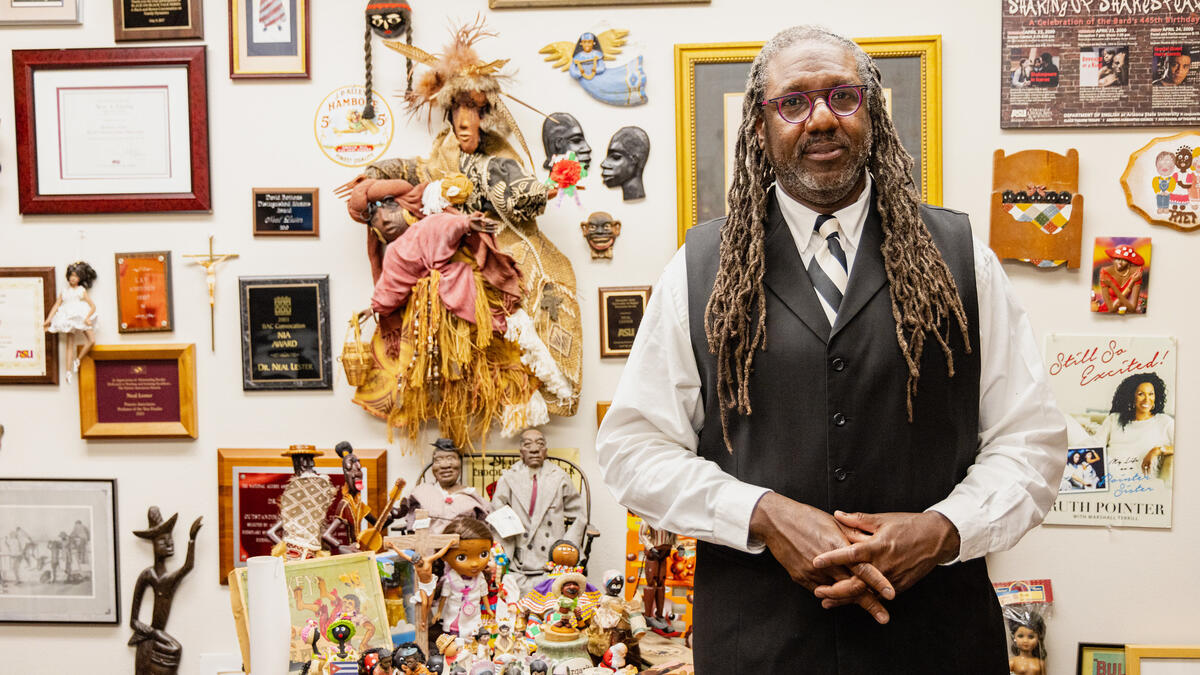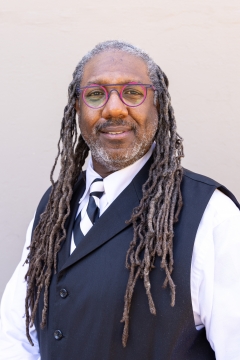Project Humanities director wins ASU award celebrating spirit of difference making

The annual Gary Krahenbuhl Difference Maker Award was established through the generous contributions of faculty, staff and friends of Arizona State University, to honor a faculty member who personifies the spirit of difference making as demonstrated by Krahenbuhl, a former dean of The College of Liberal Arts and Sciences.
This year, the college recognized Neal A. Lester for his active involvement in community engagement and advocacy for social justice, along with his work in the award-winning Project Humanities university initiative.
Neal A. Lester
Lester is a Foundation Professor of English and founding director of Project Humanities at ASU. He came to ASU in 1997 after having taught previously at the University of Alabama and the University of Montevallo.
Lester is a prolific scholar, publishing numerous articles, chapters and books. His research and teaching interests include African-American literature and culture, race and representation, and diversity and inclusion. He is also a sought-after speaker and consultant on issues related to diversity, equity and inclusion, both within and outside of academia.
Lester brought a new way of thinking to ASU with the Project Humanities university initiative he founded 12 years ago. It aims to promote humanities study, research and humanistic thought by facilitating conversations across diverse communities.
Under the leadership of Lester, the program has gained recognition and become a leader in local, national and international conversations about shared humanity. The initiative has created Humanity 101, which is a toolbox of diverse programs and activities focused on proving that humanity is bound by shared experiences. This movement promotes local synergy, empowerment and awareness through seven principles: kindness, compassion, integrity, respect, empathy, forgiveness and self-reflection.
The Project Humanities programs highlight cross-communal outreach as multiprofessional, intergenerational and pedagogical through two signature programs. A 10-year-long homeless outreach effort engages diverse ASU undergraduate individuals and communities in collecting, sorting and distributing clothing, shoes and toiletries to 150–200 unsheltered adults in downtown Phoenix. Undergraduates, both credit- and noncredit bearing interns and volunteers, make this outreach a subject of class projects and fraternity/sorority service projects. Lester's Introduction to Literature course inspired one undergraduate student to volunteer in this program, who eventually created his own outreach initiative.
The other program is the annual Hacks for Humanity: Hackathon for the Social Good, which is now in its 10th year. This program introduces ASU undergraduates to humanities and humanistic thinking, as well as Humanity 101 principles through intergenerational and multidisciplinary technology innovation and collaboration. The competition engages ASU undergraduates in various roles, including mentors, volunteers, participants, workshop leaders and panelists. This event has gone global, attracting participants from four states and 14 countries and collaborating with the University of Texas at Dallas on a synchronized event.
Lester's faculty teaching, research and service profile demonstrates how the three can work together symbiotically, both inside and outside the classroom. His leadership in Project Humanities has helped create meaningful cross-communal outreach and multidisciplinary collaboration opportunities for ASU undergraduates. Under his guidance, students have been able to contribute to their own personal and academic growth, as well as to the betterment of society as a whole.
Lester said he is most proud of the convergence of his research, teaching and service in his campus office. Hundreds of figurines, dolls, games, posters and other objects reinforce and introduce what is taught in his courses as well as act as a staged teaching tool, inviting critical conversations about race, whether privately in visitors’ heads or publicly with the person.
“For 30 years, my office has been a living book, a ‘colored museum,’ for students, colleagues and other visitors who enter it,” he said.
When asked about what this award meant to him, he said, “While I have personally/professionally received accolades and acknowledgments from entities outside of ASU for various reasons … it is gratifying to know that those inside ASU broadly and within The College of Liberal Arts and Sciences more specifically both acknowledge and value my work and its impact across ASU and beyond.”
More Arts, humanities and education

ASU professor's project helps students learn complex topics
One of Arizona State University’s top professors is using her signature research project to improve how college students learn science, technology, engineering, math and medicine.Micki Chi, who is a…

Award-winning playwright shares her scriptwriting process with ASU students
Actions speak louder than words. That’s why award-winning playwright Y York is workshopping her latest play, "Becoming Awesome," with actors at Arizona State University this week. “I want…

Exceeding great expectations in downtown Mesa
Anyone visiting downtown Mesa over the past couple of years has a lot to rave about: The bevy of restaurants, unique local shops, entertainment venues and inviting spaces that beg for attention from…


